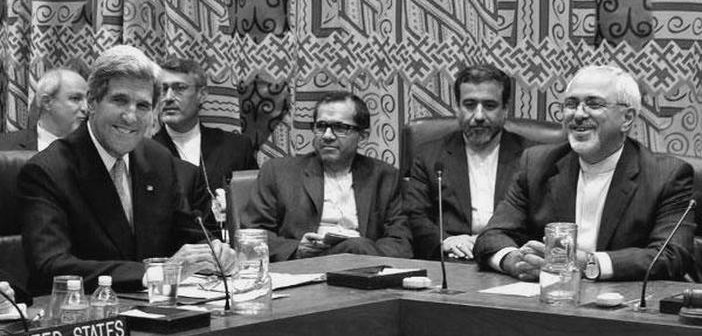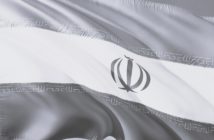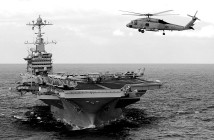On 23rd July 2015, Oman celebrated the 45th anniversary of its ‘renaissance’ or Nahdah, the period of Sultan Qaboos’ rule, which has seen the former ‘herm it kingdom’ open up to modernisation and the world. Ironically, much of Oman’s nouveaux middle class took the opportunity of the long weekend to head to the UAE to enjoy its ultra-modern attractions. One area where Oman can confidently claim superiority over its wealthier Gulf neighbours, however, is its “constructive diplomacy” and its ability – thus far – to avoid entanglement in the region’s increasingly dangerous conflict zones.
The sultanate’s role in the “historic” agreement signed between great powers (P5+1) and Tehran is possibly the crowning achievement in Oman’s diplomatic record thus far, and grows its reputation as a state that can help resolve the region’s thorniest issues. Omanis are justifiably proud of their government’s successes on the international stage. Newspapers in Muscat carried the headlines: “Oman’s crucial role in Iran deal hailed by US”, “Iran praises Oman’s role in landmark nuclear deal”, and “Oman hopes Iran deal will lead to peace, stability.” But does this deal really improve Oman’s and the region’s security and stability?
Both the P5+1 powers and Tehran claimed a historic victory after the July 14, 2015 agreement, which was endorsed by the UNSC six days later (notably US Congress still largely opposes it, particularly regarding the terms surrounding site inspections). With the agreement falling on Bastille Day, the French envoy to the UN said it was a turning point towards greater regional stabilization. Likewise, Tehran lauded Oman’s role and spoke of a new chapter of regional cooperation; immediately, however, bellicose rhetoric resumed on both sides. The US, anxious to reassure its Israeli allies and retain what’s left of its image among Sunni Arab states, promised to crackdown on Iran’s allies and proxies in the Arab world like Hezbollah in Lebanon and the Houthis in Yemen. Likewise, Iran’s Ayatollah Khamenei stated in a fiery speech that Iran will continue to strongly confront US designs in the Middle East. Saudi officials signaled determination to pursue their own ‘peaceful’ nuclear energy programs in the wake of the deal, and the Syrian conflict stands to suffer prolongation and escalation from a politically and financially reinvigorated Iranian-Assad axis.
For Oman there is a lot at stake in their efforts to balance regional rivalries. The country’s long term strategy hinges on converting its oil exporting economy into a fully diversified hub of trade, tourism and logistics at the core of the Indian Ocean-Gulf littoral. The success of this plan will depend on whether it can continue to straddle the increasing perilous ground between Saudi-led Arab states, and Iran and its regional allies. The growing polarization in the region is causing many in the Gulf States to begin accusing Oman of siding with the Iranian ‘enemy’. It seems that a George W. Bush-like ‘you’re either with us or against us’ mentality is growing, which makes holding the middle ground increasingly difficult. On the plus side, Oman’s economic and security relations with the West remain exceptionally strong – particularly the US and the UK. But while Oman has consolidated its already good relations with Iran – plans for a trans-Gulf ferry service were quickly pushed forward since the landmark nuclear deal – more work is required to convince its GCC partners of its good intentions and the reasoning behind its neutral stances.
With the US-Iranian (semi)rapprochement Saudi Arabia will possibly assert itself even more aggressively against Iran’s allies in Yemen and in Syria. The UAE, while standing to gain significantly from renewed trade with Iran, is becoming gradually implicated in conflict zones and has lost several military personnel in Yemen. And Kuwait’s much vaunted stability was recently shattered by a sectarian bombing of a Shi’a mosque. Almost every Gulf state except Oman seems to be falling victim to sectarian provocations and pressure to take sides in regional conflicts.
With this in mind is the nuclear deal, which Oman helped broker, a positive or negative factor for regional stability? The success of the negotiations certainly provides an encouraging sign that diplomacy and dialogue can be effective in resolving intractable issues. Moreover, any reduction in the expansion of nuclear weapons can only improve regional security and the potential for major catastrophe in the future. However, the lifting of sanctions on Iran will allow it to more effectively support Syria’s Assad regime, Hizballah in Lebanon, and the Houthis movement in Yemen. Likewise, the Saudis and its Gulf allies, and Turkey have recently resolved to cooperate on areas of mutual interest in Syria, in short, the toppling of the Assad regime. It is likely therefore that the chances for victory by either side have dimmed while the potential for escalation and prolongation of conflict along increasingly sectarian lines has been increased.
The nuclear deal has provided US president Obama with an important legacy for his administration but it has in some ways reinforced and endorsed the regional political status quo. Iran has long presented itself as the leader of resistance against Western imperialism and the Israeli occupation and therefore placed itself as the champion of the Arab and Islamic street. But its prominent role in supporting the Assad regime’s repression of Syria’s popular revolution diminished the chances for a much needed political transformation in the Levant and added accelerant to the “firestorm” that has since engulfed Syria. The Gulf monarchies have also seized on the chaos in Syria, Iraq and Yemen to defuse any democratic social impulses and consolidate their control.
Finally, it should be remembered that Iran’s key allies Hizballah and the Syrian regime were accused by an international court (the Special Tribunal for Lebanon, STL) of terrorist bombings and political assassinations in Lebanon dating back to 2005. The court was established to support the judicial system of the Lebanese state but also to address the crisis of impunity for political murder in the Levant and the use of terrorism as a foreign policy tool. At a pivotal moment when the international community sought to introduce a new form of accountability in international affairs, the STL’s work was undermined by the diplomacy campaigns of European states and later the new Obama administration, all of whom were keen to showcase their ability for constructive engagement with Damascus and Tehran. Subsequently Bashar al-Assad was rehabilitated internationally and even attended Bastille Day celebrations in Paris as a special guest on 14 July 2008.
Seven years later exactly, on 14 July 2015, the nuclear deal was signed with Iran; Omani officials celebrated the diplomatic achievement with French officials in Muscat. Oman’s efforts and good intentions to bring hostile parties together are praiseworthy. It would be highly unfortunate, however, if the deal with Iran amounted to a similar rehabilitation for the Assad regime and the undermining of accountability for the massive political violence and state terrorism exacted on the Syrian population since 2011. In order to achieve peace and stability in the region, which will benefit the economic and security imperatives of states like Oman, diplomacy should also take accountability into consideration. While it seems an impossible dream at present, new normative frameworks of accountability, enforced through international commitments, must eventually apply equally to the actions of all international and sub-national actors, including for example ISIS, the Assads, Israel or even the US.
Small states like Oman (and also New Zealand; currently chairing the UNSC) should seek to leverage its neutrality and growing diplomatic resources towards this end in order to maximize its chances to continue along its renaissance path.






1 Comment
Pingback: The Iran Deal Roundup, Ctd - Unsightly Mental Blemishes